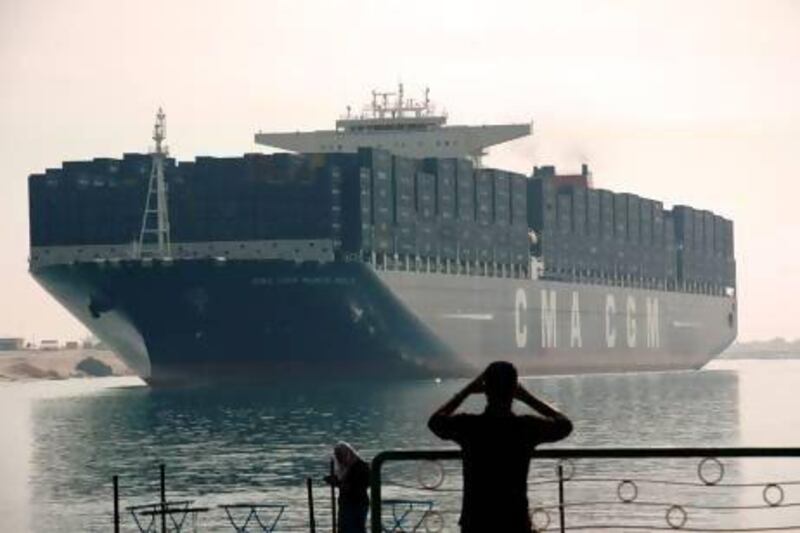For 16 days this month, not a single shipping container moved into or out of Egypt's principal port for Asian trade.
Labourers at Ain Sukhna, on the Suez Canal east of Cairo, were busy protesting management's plans to continue using short-term employment contracts.
The roughly 1,200 striking dock workers, who slept each night in empty containers while campaigning for permanent jobs with the port operator DP World, hung a white banner reading "Our one demand is to be hired," alongside a large Egyptian flag.
"I'm not demanding more money," says Mahmoud Mustafa, a married father of two girls who earns the equivalent of about US$500 (Dh1,837) a month. "I just want stability for myself and my family."
The stand-off, which ended on February 17 when the government agreed to give the strikers jobs with a new state-controlled port company, showcased workers' growing activism two years after the overthrow of president Hosni Mubarak.
More than 1,000 independent unions are colliding with an Islamist government that has been unable to arrest the economy's deterioration and is pushing to prevent the rise of alternative political forces.
"The government's ability to control workers ended with Mubarak," says Mohammed Abdeen, the general coordinator of legislation for the Egyptian Federation of Independent Trade Unions (EFITU) in Cairo. "It doesn't exist anymore. You can't control them."
For investors, labour's strength - and its weakness - may prove equally vexing. Egypt's workers are strong enough to interrupt commerce, yet too divided to force a resolution of the country's political stalemate.
Since the 2011 revolution, Egyptian workers have launched more than 3,000 strikes or demonstrations over wages, working conditions and political demands, Mr Abdeen says.
As Egypt averaged 7 per cent annual growth in the three years before the 2008 financial crisis, the promise of a compliant state union and low wages was instrumental in attracting investors from the United States, Europe and the Arabian Gulf. Foreign direct investment soared to more than $13 billion in 2008 from $2bn four years earlier.
Even so, three fledging independent labour unions emerged and major strikes shook the regime.
With Egypt now trapped in a protracted transition from dictatorship to democracy, foreign investment has evaporated. In the months ahead, transport strikes with "the potential to cause considerable disruption to business operations and supply chains" are likely, according to a report by Maplecroft, a risk-management firm based in the United Kingdom.
The government is taking steps to improve Egyptians' standard of living, the finance minister El-Morsi El-Sayyed Hegazi told reporters in Cairo yesterday, including raising the income-tax exemption to 12,000 Egyptian pounds (Dh6,538) from 9,000 pounds.
Still, he says, the current strikes and port closures are hurting efforts to revive the economy.
Labour unrest is just one element of the country's broader disorder. From the capital to Suez Canal ports, Egypt in recent weeks has come close to unravelling. Protests are a routine occurrence in Cairo's Tahrir Square where a burnt-out police van symbolises authority defied.
At the Sukhna port, also idled for two weeks during a November labour dispute, the recent work stoppage blocked imports of raw materials for plastics, petrochemical and textile factories and exports of phosphates, marble and citrus fruits, says Ayman Badawy, the commercial manager for DP World. The strike also deprived the cash-strapped government of more than $2m a day in customs duties.
"We're trying to encourage investors to come to Egypt," Mr Badawy says. "By all of these things happening, no one will come here and invest."
The benchmark EGX30 stock index is less than half its 2008 peak and the premium investors demand to hold Egyptian debt over similar-maturity US securities has more than doubled since the January 2011 start of the uprising.
The president Mohammed Morsi, elected in June, and his Muslim Brotherhood allies have been no more hospitable to union organising than was Mr Mubarak.
Since Mr Morsi's November constitutional decree, the Egyptian pound has surrendered about 10 per cent of its value against the dollar.
The decline, which makes imported goods more expensive, helped to push up prices an annualised 6.3 per cent in January.
Traders expect the pound to lose an additional 16 per cent of its value over the next year, according to non-deliverable forward prices. So price increases are likely to escalate to an annual rate of 8.3 per cent, according to the median forecast of economists surveyed by Bloomberg.
Coupled with a sinking Egyptian currency, the IMF-decreed policy changes will only make life more expensive - and the clash between government and labour more dangerous.
"The Muslim Brotherhood's policies will impoverish the Egyptian people even more," says Mr Abdeen, adding: "Egyptian workers won't go back. They won't retreat."
* Bloomberg News





